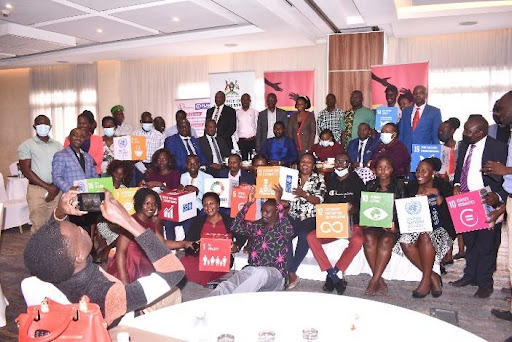
The SDG Secretariat at the Office of the Prime Minister (OPM) together with the Youth Advocacy and Development Network (YADNET) organized a National Youth Dialogue gathering state and civil society youth stakeholders from all regions of Uganda. The event supported by CUSP took place on June 14th at Golden Tulip Hotel as a side event to the first Annual SDG Conference (June 16-17).
The multi-stakeholder dialogue was, among others, attended by the OPM, MGLSD, UBOS, ULGA, MES, the National Youth Council, the SDG Youth Coalition, representatives from youth organizations and think tanks from all over Uganda and the Delegation of the European Union. While 55 participants were present in Kampala, 214 registered online.
Vivid discussions evolved around questions and issues that were raised by the opening speakers and through presentations given by key stakeholders, in the scope of a panel discussion and an extensive Q&A session with the audience: Where does Uganda stand when it comes to youth participation in development processes? How can meaningful and inclusive youth participation in the SDG Agenda be assured? What do best practices look like? What are challenges, lessons learnt and possible solutions? Which activities are already undertaken by the youth to enhance SDGs and how do local Governments support youth programs across the country?
Dr Albert Byamugisha, Head of the OPM SDG Secretariat, acknowledged that for the government to continue its commitment of “Reaching the Furthest First” through the SDG Framework, there is need to use an integrated approach, partnerships and participation including youth stakeholders. Francis Kyateka Mondo, the Commissioner Youth at MGLSD, confirmed that the government advances in youth programming to fully involve young people to achieve the 2030 Agenda as a constitutional right. He encouraged the youth to take full advantage of the Parish Development Model. In working groups, the stakeholders developed a Youth Position Paper that informed the Main SDG Conference. Therein, the youth stakeholders defined their role in advancing the SDGs and articulated recommendations on how to improve meaningful inclusive participation, for example through the scaling up of SDG localization, stronger partnerships on the local level and improved data collection.

